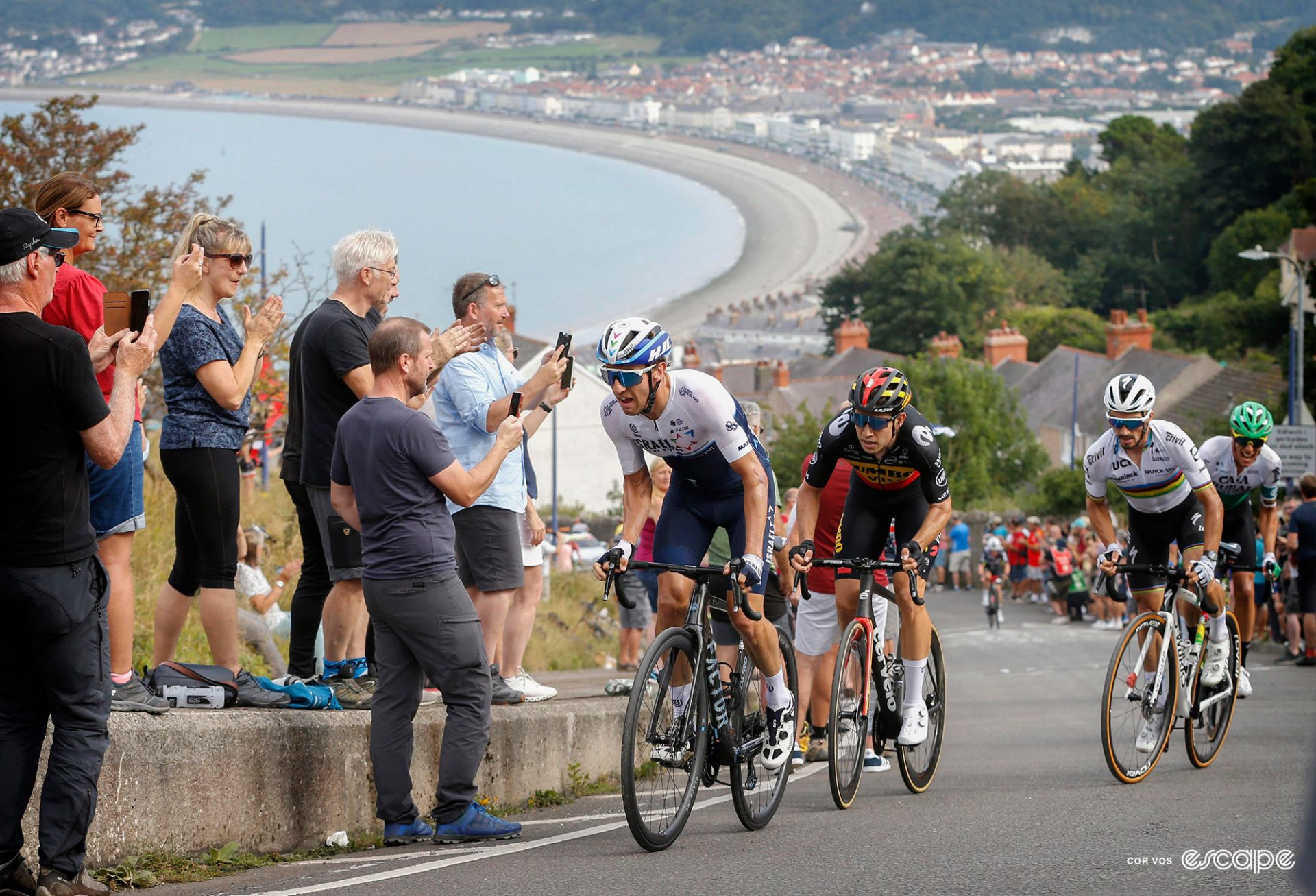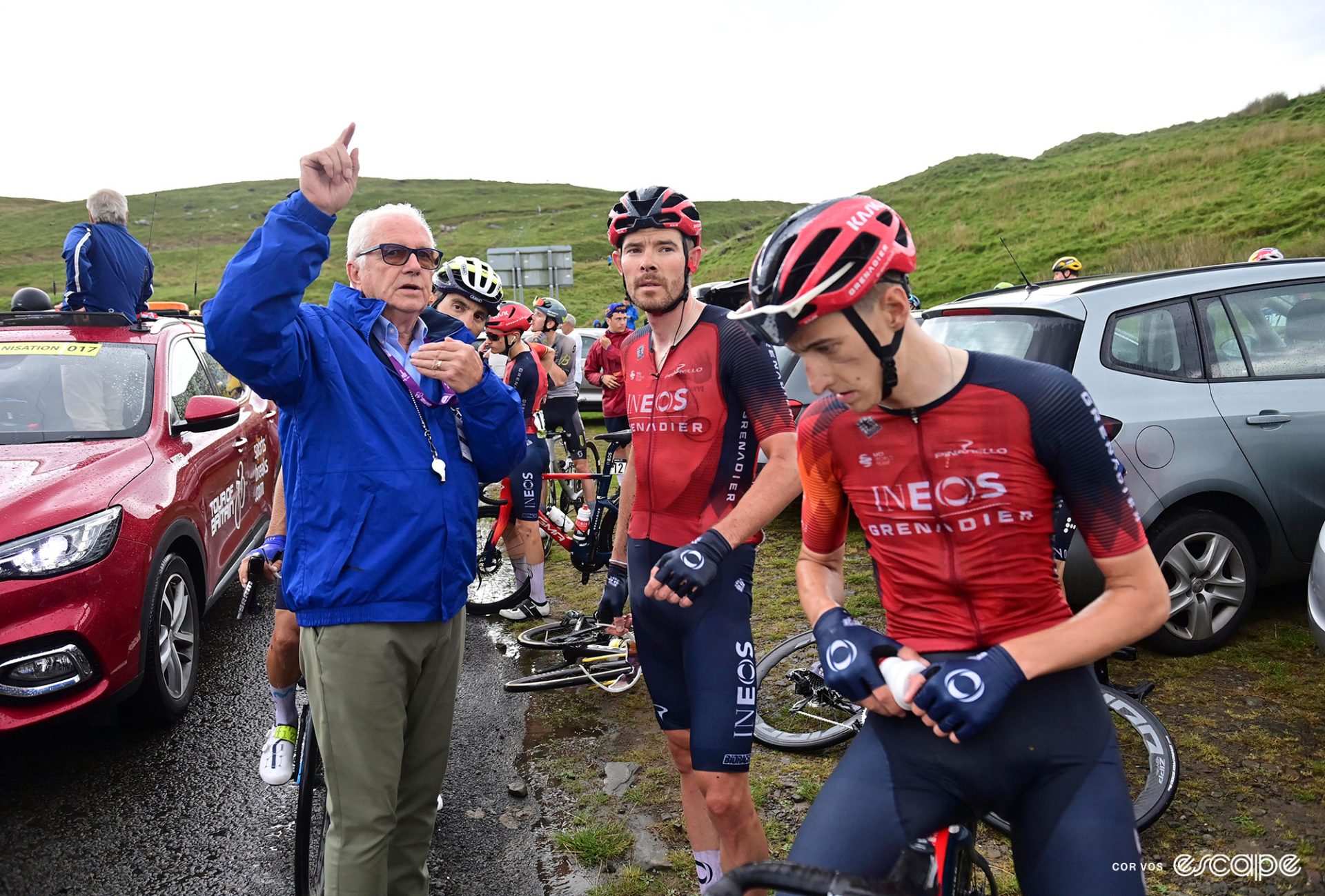This story was written by Abby Mickey and Jonny Long.
There was something ever so slightly different about the 2024 UCI racing calendar this week.
A couple of scrubbed lines where the Women’s Tour and Tour of Britain should have been belied the true loss to the UK scene should neither premier British racing event take place this year.
The reason behind the likely loss of both races is British Cycling’s recent termination of their contract with organiser SweetSpot, in what the governing body say is a financial dispute over unpaid rights fees. This more of the same but a different flavour for the Women’s Tour after it didn’t go ahead in 2023 due to a lack of financial backing.
It should be reiterated this news is not yet official, merely spotted by the most eagle-eyed observers of the UCI’s calendar, but those well-sourced on the matter say confirmation is expected later this week, in what will almost certainly be the latest low point for British cycling.
It comes at a time when the country has never had more riders in both the men’s (33) and women’s (21) WorldTours, as the professional ranks see the product of the 2010 boom years, but the domestic bubble appears to have burst. Historic bike shops are shutting (just google ‘iconic uk bike shop closes down’ and take your pick), big retailers are also struggling, but at least you no longer hear of medium-sized racing teams calling it a day – mostly because there already aren’t that many of those left.
The death of the British scene has been proclaimed for a while, but like Monty Python’s Black Knight sketch, cycling persists. ‘Tis but a scratch as UK racing and industry tips into the North Sea. That this has been a slow death is a testament to the people still holding up the sport in the UK, often volunteers who give their time, money and energy to put on races, manage teams, race bikes and watch people race bikes at the side of the road. Meanwhile, Olympics track star Ed Clancy, by way of his British Cycling Elite Road Racing Task Force, has come up with 16 recommendations to knock some sense into the way things are being run by the governing body and hopefully turn the tide.
Regardless, the likely loss of the two premier stage races leaves the meagre offering of only the Rutland Melton CiCLE Classic, RideLondon Classique, and the National Road Championships on the UCI-sanctioned racing calendar.
From last legs to knockout blow for the Women’s Tour
When the Women’s Tour was first added to the calendar in 2014 it quickly became one of the top events for the peloton. The organization and professionalism of the race made it a must-attend event, with top honours claimed by stars like Marianne Vos, Demi Vollering, Kasia Niewiadoma, Lizzie Deignan, and most recently Elisa Longo Borghini. But in the last three years, other women’s races have provided more live coverage and prestige than the British stage race, and in a post-COVID-19 pandemic world, the Women’s Tour has struggled to remain on the women’s calendar.
British television rights and costs higher than those in continental Europe have always made live coverage a challenge for the Women’s Tour, but the race continued to provide the best post-race packages they could. But when the UCI began to mandate live coverage requirements for all women’s WorldTour races, the Women’s Tour failed to deliver even the minimum to satisfy the rules. The Giro Donne was in the same boat, and after the 2020 edition, the UCI temporarily demoted the Italian stage race from the WWT. Still, the British race never received the same punishment, even after the 2021 event failed to provide coverage.

By 2023 the race was on its last legs. Sans title sponsor and under pressure from fans, riders, and the UCI to provide live coverage, the race was eventually cancelled weeks before it took place. But organizers assured the public they were already working hard to make the 2024 event a reality, especially with the Paris Olympics on tap in July.
Unfortunately, just one month into the new year news dropped that the race’s promotor SweetSpot had entered into voluntary liquidation to offset legal issues to the tune of £1 million.
“Liquidation started to become a possibility back in July. Because we were already under a lot of pressure financially with the Tour of Britain,” SweetSpot CEO Hugh Roberts told The Guardian, citing the pandemic, the September 2022 death of the Queen (which forced the cancellation of the last three ToB stages due to protocols around observing the death of a monarch), and British Cycling as reasons for the organisation’s failure. “It’s the end of an era. It’s twenty years of hard work that have come to this.”
-Abby Mickey
The Tour (no more) of Britain
Decline is undoubtedly the defining post-2008 mood of Britain. No matter where you stand on the socio-political spectrum you have likely been done a injustice somewhere along the line.
Wages are stagnant, rents and the cost of living are up, house prices also keep rising (which I’m told is a good thing), but so have mortgage rates. And your pension probably isn’t looking as good as it once did. You have to pay 20p for the privilege of using the toilet at many major bus and train terminals, while others are getting big mad about defending statues, the banning of XL bullys, and kids will soon no longer be allowed to huff on cookie-flavoured disposable vapes.
Everyone, everywhere is fed up. The glow from the 2012 Olympics, that very expensive shot to the arm for a quick-release dose of national pride, followed by the Tour de France success of the next decade meant British cycling fans could hold on to an bizarrely-shaped, Rupert-Murdoch-wants-to-save-the-orcas symbol of hope that maybe only 99% of things were terrible. The fact that the #PassOnPlastics press release is now bedecked with the branding of petrochemicals giant Ineos will be seen by some as the sort of schadenfreude deserved by the hubris of British cycling’s 2010s, where Continental teams rode around with budgets they didn’t know what else to do with than spend spend spend, and the sense seemed to be in some quarters that the magic money tree was here to stay.
Sorry, that was quite moany, but how else should British fans be taking the news that the Tour of Britain, whose origins dates back to just after the Second World War, could be no more?
Stood atop the Great Orme amongst hundreds of other fans at the 2021 race watching World Champion Julian Alaphilippe and Wout van Aert duke it out up the climb, you wouldn’t have imagined just three years later the race would not exist. Even if casuals had abandoned the sport post-Team Sky era, there was clearly still an appetite for fans to watch professional bike racing and for riders to prep for the late September Road Worlds by finding out the simple pleasure of what staying in a Travelodge entails.

The reasons for the failure, as Abby noted above, are myriad. Brexit, global pandemic, the Queen’s passing, the ongoing death spiral of British Cycling, a full English breakfast of ailments that can easily blow off course the already precarious nature of holding increasingly expensive bike races on increasingly busy public roads.
While the continued absence of the Women’s Tour will likely be more impactful to the women’s side of the sport as a whole, the sliding-into-the-sea of the men’s race is more a tale of institutional loss, a mausoleum for the uncertainty and decline that currently mars the sport in Britain.
Is there any hope to be derived, anywhere? It depends. Ineos Grenadiers’ new CEO John Allert recently told a press call, reported by Road.cc, that his team were “very interested stakeholders in terms of [the Tour of Britain being] a home race.”
Jim Ratcliffe’s industrial behemoth, now preoccupied with turning around another instance of sporting decline in the form of ownership of Manchester United, is apparently prepared to stump up the equivalent of about two months of Marcus Rashford’s wages, to protect the future of the Tour of Britain.

“All I can say is as a team with British heritage we will work with any stakeholders, British Cycling or any commercial stakeholders, to as quickly as possible see a Tour of Britain back on the calendar,” Allert explained. “I think it’s an important race, not just for the UK, but some of these national races are huge opportunities for local riders, non-WorldTour teams, and for local fans … having a gap on the calendar like that is not good for the sport.”
No mention of the Women’s Tour, however, from a €50 million-funded squad that is one of the five teams in the men’s WorldTour to still not field a women’s WorldTour or Continental squad. The Shell sponsorship of British Cycling rankled, and that was before the protestations that they would be helping the governing body achieve net zero, while an Ineos-backed Tour of Britain would likely traverse the vast swathes of land where the company owns controversial fracking rights.
Don’t tell me to cheer up.
-Jonny Long
What did you think of this story?

